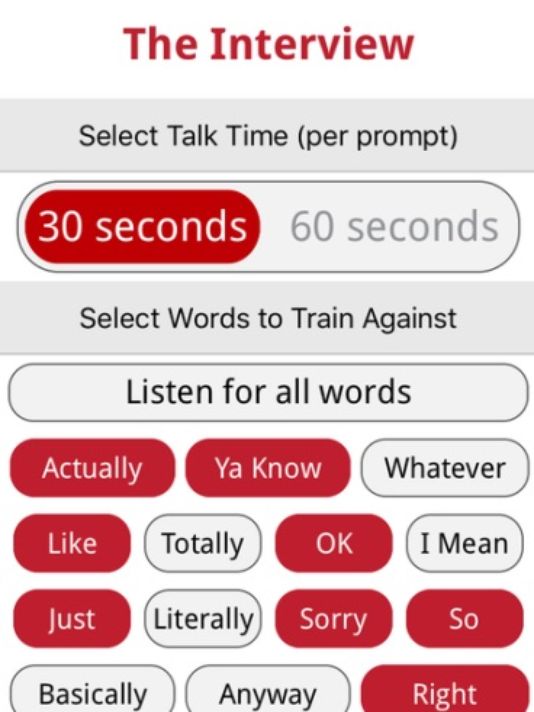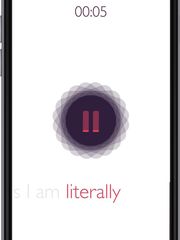Two new iOS apps aim to replace an expensive in-person speech coach


LikeSo and Ummo are two new applications that analyze your speech and can help you improve your diction. So we put a movie famous for its speech - Clueless - to the test. Ed Baig for USA TODAY.

LikeSo lets you choose the words to look out for.(Photo: LikeSo)
NEW YORK--“So, ya know, like, frankly my dear, I totally, just don’t give a damn.”
OK, so that’s not quite the way Rhett Butler (Clark Gable) delivered his famous parting words to Scarlett O’Hara (Vivien Leigh) in Gone With The Wind.
My exaggerated rewrite of a classic movie line is meant to illustrate the problem that the two new self-described personal speech coach apps I’ve been checking out on my iPhone are attempting to address: notably to eliminate the “filler” words that all-too-frequently populate our speech. I ran the apps through another movie, Clueless, known--"as if"--for its unforgettable take on the vernacular.
I’m speaking of LikeSo (99 cents from Say It Media) and Ummo ($1.99 from Ummo Inc.), and you can use them to practice and, to varying degrees, analyze your speech. The goal is that these iOS apps may improve your confidence and prospects, if say, you have to give a presentation, nail a job interview, or impress a date. Android versions are in the works.
You'll find several apps these days that purport to improve your oratorical and pronunciation skills and they're all considerably less expensive than spending upwards of $500 for a one-hour session with a professional speech coach. Relatively recent advances in speech recognition help make such apps possible. Machine learning may also play an increasing role.
In LikeSo and Ummo, I tried two of the latest speech coach entrants. Regardless of how well they may do at changing your speech patterns over the long haul, I thought the pair were, um, uh, kind of fun.
You have two ways to interact with the LikeSo app, which was developed by Audrey Mann Cronin, a longtime communications consultant, who says she was partly inspired after hearing her otherwise well-spoken teen age daughter pepper her speech with “like,” “um” and “ya know.”
In “Freestyle” mode you get to gab for a designated length of time about any subject on your mind. Using speech recognition from Nuance, the app listens for any of 14 key filler words or phrases you may utter--actually, ya know, whatever, like, totally, OK, I mean, just, literally, sorry, so, basically, anyway, or right.
After finishing, the app reveals how long and how fast you talked, and how many and which of the filler words you used. You are rated (on a percentage basis) on how articulate you are.
If you interact via “TalkAbout” mode instead, you get to practice for specific situations: The Interview, the Debate Team, Speed Dating and so on. If you choose Debate Team, for example, you’re prompted to make the case for or against bans on animal testing, global warming or other subjects. Chose Speed Dating, and you might be asked to filibuster about your dream career or views on marriage.
The app doesn’t care about your opinions, of course, just which filler words you’ve used.

Ummo can literally highlight trigger words as you speak. (Photo: Ummo)
The Ummo app also employs speech recognition via Nuance to listen for designated filler words and phrases, some that overlap with LikeSo’s list, and some (kind of, uh/um) that don’t. The company is also relying in part on machine learning through IBM Watson.
One big advantage is that you can add your own custom words to watch out for, a feature LikeSo currently lacks. That’s helpful if there’s a word you tend to overuse that you’d like to eliminate or cut down from your speech. It also allows for regional differences—perhaps if you’re Canadian you might flag the use of the common interjection “eh.”
Ummo is all about a freestyle approach. You can speak for as long or short as you wish on any subject. As you do, the words you say appear on the screen after a slight lag, with the designated filler words highlighted in red on the screen. You can also have the app play a sound when a trigger word is said.
The app, which was developed by five Harvard Business School students, supplies graphical feedback on pace, volume, fillers, clarity and pauses. You can see an annotated transcript of your words, but can’t store results from session to session to analyze your progress.
Ummo is working on a version for businesses that among other features can apply speech recognition during meetings and conference calls. The company has also hinted about a future version that might work with wearables—imagine getting a buzz on your wrist when you say a word you want to avoid.
For now, neither app makes a distinction when you use the word “like” in the context of liking something (candy) as opposed to inadvertently using that word as filler.
It is difficult to judge the long term effectiveness of the apps, but presumably repeated practice and just being cognizant of how you speak is beneficial.
Of course, there are varying norms as to what is considered good speech or bad, and in some instances, the use of the aforementioned filler words can actually be endearing.
What I can say with some confidence after using these apps is that I consider myself rather, um, uh, articulate. Totally.
Email: This email address is being protected from spambots. You need JavaScript enabled to view it.[1]; Follow USA TODAY Personal Tech Columnist @edbaig[2] on Twitter
Read or Share this story: http://usat.ly/27zqOKh









